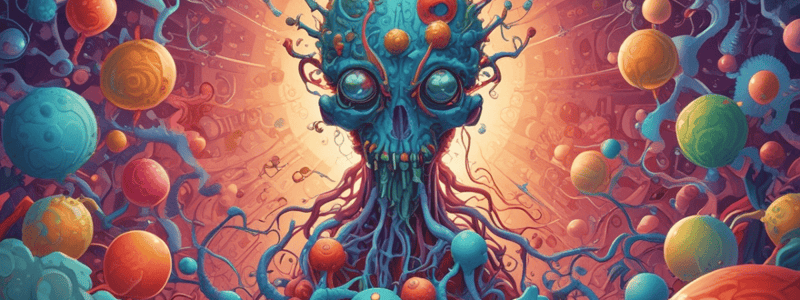Podcast
Questions and Answers
What is the primary mechanism of passive immunisation?
What is the primary mechanism of passive immunisation?
- Induction of long-lived immunity
- Artificial manipulation of the immune response
- Stimulation of the recipient's immune system
- Transfer of antibodies directed at specific infective agents (correct)
Live attenuated vaccines require an adjuvant to enhance immune response.
Live attenuated vaccines require an adjuvant to enhance immune response.
False (B)
What is the main difference between passive and active immunisation?
What is the main difference between passive and active immunisation?
Passive immunisation provides immediate protection through antibody transfer, while active immunisation stimulates the individual's immune response to provide long-term protection.
Adjuvants are often adsorbed onto ______________________ to enhance their effectiveness.
Adjuvants are often adsorbed onto ______________________ to enhance their effectiveness.
Which type of vaccine is made by recombinant DNA technology?
Which type of vaccine is made by recombinant DNA technology?
Tetanus antitoxin is an example of active immunisation.
Tetanus antitoxin is an example of active immunisation.
Match the following types of vaccines with their characteristics:
Match the following types of vaccines with their characteristics:
What is the role of adjuvants in vaccine development?
What is the role of adjuvants in vaccine development?
What is immunisation according to the World Health Organisation?
What is immunisation according to the World Health Organisation?
Natural immunisation occurs through natural infection or maternal antibodies.
Natural immunisation occurs through natural infection or maternal antibodies.
What is the difference between active and passive immunisation?
What is the difference between active and passive immunisation?
A _______________ is a substance that enhances the immune response to a vaccine.
A _______________ is a substance that enhances the immune response to a vaccine.
What is the purpose of an adjuvant in a vaccine?
What is the purpose of an adjuvant in a vaccine?
All vaccines are administered through injection.
All vaccines are administered through injection.
Corticosteroids are a type of _______________ medication.
Corticosteroids are a type of _______________ medication.
Why should live attenuated vaccines be avoided in pregnant women?
Why should live attenuated vaccines be avoided in pregnant women?
Inactivated vaccines can infect the fetus.
Inactivated vaccines can infect the fetus.
What is the general rule for administering immunoglobulin after vaccination with live vaccine?
What is the general rule for administering immunoglobulin after vaccination with live vaccine?
In the presence of severe _______________ immunodeficiency, oral polio vaccine (live attenuated) should not be used.
In the presence of severe _______________ immunodeficiency, oral polio vaccine (live attenuated) should not be used.
What is a contraindication for vaccines containing neomycin?
What is a contraindication for vaccines containing neomycin?
Vaccination should be postponed in patients with mild infections.
Vaccination should be postponed in patients with mild infections.
Match the following vaccines with their recommended use in immunosuppressed individuals:
Match the following vaccines with their recommended use in immunosuppressed individuals:
When administering multiple vaccines, it is important to:
When administering multiple vaccines, it is important to:
In the case of thrombocytopenia or bleeding disorders, vaccines should be administered intramuscularly.
In the case of thrombocytopenia or bleeding disorders, vaccines should be administered intramuscularly.
What is the primary function of prostaglandins in wound healing?
What is the primary function of prostaglandins in wound healing?
In the case of a history of _________, vaccination is contraindicated.
In the case of a history of _________, vaccination is contraindicated.
What is a potential side effect of vaccination?
What is a potential side effect of vaccination?
Vaccines are 100% effective in protecting all recipients.
Vaccines are 100% effective in protecting all recipients.
Match the following conditions with their corresponding vaccination considerations:
Match the following conditions with their corresponding vaccination considerations:
Prostaglandin production is facilitated by _______________________ enzymes.
Prostaglandin production is facilitated by _______________________ enzymes.
What is a hapten?
What is a hapten?
Toxoid vaccines are made from weakened viruses.
Toxoid vaccines are made from weakened viruses.
What is the purpose of inactivating or suppressing the toxicity of a bacterial toxin to create a toxoid?
What is the purpose of inactivating or suppressing the toxicity of a bacterial toxin to create a toxoid?
The measles vaccine is an example of a __________ vaccine.
The measles vaccine is an example of a __________ vaccine.
Match the following vaccine types with their characteristics:
Match the following vaccine types with their characteristics:
Which of the following is an example of a next generation vaccine?
Which of the following is an example of a next generation vaccine?
All vaccines use adjuvants to enhance their immunogenicity.
All vaccines use adjuvants to enhance their immunogenicity.
What is the difference between a vaccine and a toxoid?
What is the difference between a vaccine and a toxoid?
Flashcards are hidden until you start studying
Study Notes
Immunisation
- Immunisation is the process of making a person immune or resistant to an infectious disease.
- Types of immunisation:
- Passive: transfer of antibody directed at a specific infective agent, recipient's immune system is not stimulated, acts immediately, and is short-lived.
- Active: results from stimulation of a person's own immune response, considerable delay before protection, and immunity is long-lived.
Vaccine Types
- Live attenuated vaccine: natural live organisms manipulated to be harmless, but still viable, inducing excellent immunity with durable protection.
- Inactivated vaccine: organism or parts of organism capable of eliciting an immune response, but not capable of causing infection, may require an adjuvant.
- Toxoid: bacterial toxin with suppressed toxicity, but maintained immunogenicity, used for vaccination.
Hapten
- A small molecule that is not immunogenic on its own, but becomes immunogenic when conjugated to a carrier protein.
Vaccine Examples
- Live attenuated: smallpox, measles, mumps, rubella, varicella, BCG, polio (oral).
- Inactivated: pertussis, cholera, hepatitis A, B, haemophilus influenzae, influenza, polio (parenteral), meningococcal, pneumococcal.
- Toxoid: diphtheria, tetanus.
Next Generation Vaccines (COVID-19)
- Protein subunit vaccine
- Messenger RNA (mRNA) vaccine
- Vector vaccine
Special Points to Consider
- Immunisation and medication
- Pregnancy: live attenuated vaccines should not be administered, woman immunised with live attenuated vaccine should not become pregnant within 4 weeks.
- Immunoglobulin or blood products: prevent fully effective immunisation for at least 3 months.
- Febrile illness: postpone vaccination in acutely ill, severely febrile patients.
- Traces of antibiotics: found in some vaccines, history of systemic hypersensitivity is a contraindication.
- Immunosuppression: inactivated vaccines are generally safe, but asymptomatic HIV-infected children should be routinely immunised.
- Concurrent administration: no evidence to suggest safety and efficacy problems when multiple antigens are administered simultaneously.
- Bleeding disorders: vaccine should be administered subcutaneously or intramuscularly with caution.
- Biological variation: vaccines are biological substances and will elicit different responses in different people.
Contraindications to Vaccination
- History of serious reaction, encephalopathy, Guillain-Barré syndrome, or temperature ≥ 40.5°C within 48 hours of vaccination.
- Collapse or shock-like state within 48 hours of vaccination.
- Persistent, inconsolable crying lasting > 3 hours, occurring 2 weeks after vaccination.
Prostaglandin and Inflammation
- Prostaglandin production is facilitated by cyclooxygenase enzymes (COX-1 and COX-2).
- Functions of prostaglandin:
- Necessary for wound healing.
- Promotes inflammation (including pain and fever).
- Plays a role in platelet activation.
- Protects the stomach lining from stomach acid.
Studying That Suits You
Use AI to generate personalized quizzes and flashcards to suit your learning preferences.




